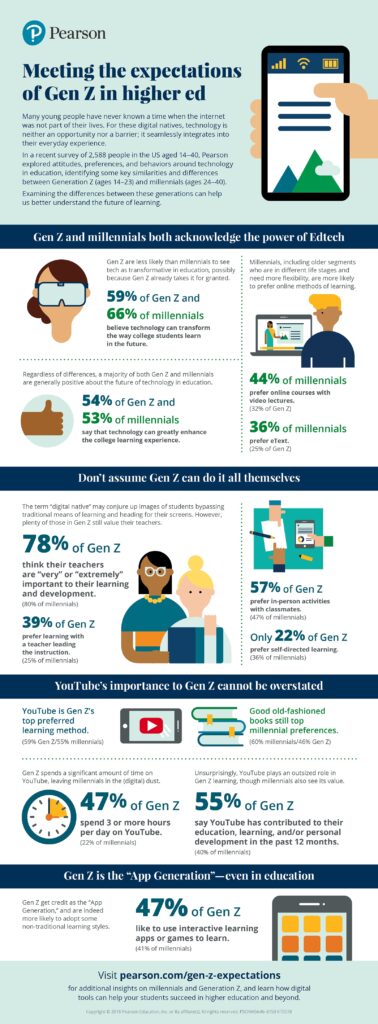Generation Z

Overview and Introduction: The WHAT and WHO

Generation Z (also known as Gen Z or Zoomers) refers to many of today’s college students, born between 1997 and 2012. They have distinct defining moments, attitudes, communication preferences, values, and aspirations compared to preceding generations. Gen Z students are admired for how they push back against the status quo and prioritize wellness over a grinding work culture. They offer a nuanced critique of our education system, highlighting its shortcomings in preparing young people to thrive in today’s world.
Gen Z students are intelligent, motivated to make a change, and efficient in their use of personal resources. They are pragmatic, tech-savvy, and value education that is flexible, personalized, and aligned with their career aspirations. Their strong focus on mental health and well-being demands that universities provide accessible and affordable resources to foster a supportive environment. They expect universities to provide an environment that caters to their mental health, social needs, and financial concerns.
Note: This content focuses on Gen Z in the United States.
Source: https://www.pearson.com/ped-blogs/blogs/2018/05/generation-z-millennials-expect-technology-education.html
Key Attributes
- Diversity: Gen Z is the most diverse generation [1], with the US Hispanic population growing four times the rate of the total population between 2004-2010 [2]. They are more interracial than any previous generation.
- Mental Health: High levels of anxiety, even before the pandemic, and 16% have been diagnosed with ADHD [3].
- Parenting: Raised by Gen X’ers and some Millennials, they have grown up with and on technology, often used as a babysitter. They are very protected by and close to their parents.
Defining Moments of Gen Z
- COVID-19: This has exacerbated their already high levels of anxiety. One-third of Gen Z reported worse mental health during COVID-19 [4].
- Post 9/11: Also known as the Homeland generation, they have grown up in a world with global terrorism.
- Great Recession: They are fiscally conservative and mindful of value for money.
- Climate Change: Many (41%) cite global warming as the most important issue facing the world [5].
- Black Lives Matter Movement: The vast majority (90%) support BLM [6]. They engage in various forms of activism, including financial support for aligned brands [7].
- 12% attended a protest
- 41% posted on social media
- 46% have made an effort to learn
- 82% agree that racism is a major problem; 79% agree that Black Americans are frequently discriminated against.
- Political Climate: 79% say the Trump presidency has had a major impact on their worldview [7]. Trust in government has fallen to 53%, and trust in the news media dropped by 13% between April and June 2020 [7].
COVID 19
- Nicknamed “Zoomers,” they spend more time at home with their parents, giving up personal interests to help with family responsibilities.
- 80% said COVID was a significant stressor [8], and 81% said school changes during COVID negatively impacted them [8].
Aspirations: Security and Stability
Growing up with school shootings and practicing active shooter drills, half of Gen Z believe these events will have a greater impact than the election of the first African American president. Raised by “Latchkey kids,” their parents have provided the safety and stability they lacked in their own childhoods. Gen Z also report that COVID-19 was a significant stressor and 81% say that school changes during COVID negatively impacted them [8].
Attitude Toward Technology: Private Technoholics
Gen Z members reach for electronics every 7 minutes and spend more time on their smartphones than Millennials (15.4 hours a week versus 14.8 hours) [9]. They are technoholics who value security in their technology and use it to learn about others while sharing little about themselves.
Communication Preference: F2F
The majority (83%) prefer face-to-face communication. With a short attention span (5-8 seconds), they favor brief, edgy messages popular on platforms like TikTok (15-second videos) and Twitter (140 characters).
Attitude Toward Education and Career
The majority (66%) cite college debt as their number one concern [10]. Most (75%) believe there are ways to get a good education without attending college [10]. They are entrepreneurial, with 60% wanting to change the world, more than the 39% of Millennials with the same aspiration. Gen Z aims to make a difference and desires the flexibility to work anywhere, with anyone, at any time.
Understanding the unique learning needs, experiences, and motivations of Gen Z can help all faculty to think creatively in their approach to teaching this generation.

Implementation and Timing: The WHEN, WHERE, and HOW
In your class, Gen Z may have little or low tolerance for being without digital resources. There are a myriad of ways to implement educational technology to engage them. These students benefit from hands-on experiences and the autonomy to explore topics that interest them in depth.
What Gen Z Learners Need
- Digital Dependence: Gen Z students are accustomed to having digital resources at their fingertips and may have little tolerance for their absence. There are numerous ways to integrate educational technology to keep them engaged.
- Autonomous and Hands-On Learning: These students thrive in environments that offer hands-on experiences and allow them to independently explore topics of interest.
- Real-World Relevance: They value understanding the real-world applications of their studies and the impact of their work. Gen Z desires impactful careers and values innovation and flexibility in the workplace. They thrive in environments that allow them to drive change from the start, which provide meaningful roles and support career progression in impactful fields.
- Safe Space for Failure: They need a supportive environment where failure is seen as a part of the learning process, helping to ease anxiety about making mistakes.
- Collaborative Learning: Moving away from traditional lecture-based teaching, Gen Z benefits from a “meddler-in-the-middle” approach, where instructors work alongside students, helping them navigate through information and modeling that it’s okay to make mistakes.
- Transparency: They appreciate faculty who are transparent about the learning process, openly acknowledging when they don’t know something and demonstrating how to find the right answers.
Implementation Strategies
- Clear Directions: Provide straightforward, clear instructions for assignments and activities.
- Digital Integration: Incorporate educational technology into assignments, classroom activities, and assessments.
- Fast Content Delivery: Use quick, engaging delivery methods for content and graphics.
- Timely Feedback: Offer ongoing, prompt feedback to support continuous improvement.
- Bite-Sized Information: Break down information into manageable, digestible chunks.
- Face-to-face communication: Ensure opportunities for in-person interaction.
- Consider External Commitments: Recognize and accommodate students’ commitments outside of school.
- Embrace Failure: Encourage a learning environment where failure is accepted as a natural part of the learning process.
Gen Z Student Quotes – What are faculty doing well? How can faculty support student success?
Below are a few select quotes from Gen Z students that were collected by Cindy Boglin, Assistant Director for Academic Services within the Polytechnic School. Students were asked to share what faculty are doing well in their engineering courses at the Fulton Schools of Engineering at ASU and how faculty can support their success.
- “Integrate a socially conscious curriculum.”
- “Really cares for the students and the material! Bridges the gap between academia and industry flawlessly!”
- “Have the students find the best resources and share with class.”
- “Give students great opportunities to present their thoughts and voices.”
- “Enthusiastic about the subject matter and could communicate with the students well. Also was extremely understanding toward outside circumstances like jobs and commutes and was always willing and available to help with any questions.”
- “Understand the anxiety attached to office hours or being called on in class.”

Rationale and Research: The WHY
By embracing these strategies and understanding the preferences of Gen Z students, faculty can create a dynamic, supportive, and effective learning environment. The evidence-based practices recommended for teaching Gen Z are, in fact, best practices for teaching all learners [11]. Students are diverse individuals, even within the same generation. Faculty must identify and address their unique learning needs and provide the necessary support to help them succeed in college and beyond. Instead of expecting Gen Z to conform to traditional educational practices, faculty can look to them as a model for how education can evolve in response to a changing world [12]. By considering approaches that emphasize clear communication, technology integration, a safe learning atmosphere, and hands-on experiences, faculty can enhance engagement and comprehension for all students in their classroom.

Additional Resources and References
- Can we be more like Gen Z? (Elisa Villanueva Beard and Michael M. Crow)
- Generation Z: Making a Difference Their Way | Corey Seemiller | TEDxDayton
- What Generation Z can teach adults in the new world of work? | Lisa Gunnarsson | TEDxStockholm
- What do we know about the generation after millennials? | Jason Dorsey | TEDxHouston
- Generation Z – Who are we?
References
[1] K. Parker and R. Igielnik, “What we know about gen Z so far,” Pew Research Center’s Social & Demographic Trends Project, Mar. 4, 2022. [Online]. Available: https://www.pewresearch.org/social-trends/2020/05/14/on-the-cusp-of-adulthood-and-facing-an-uncertain-future-what-we-know-about-gen-z-so-far-2/.
[2] US Census Bureau Public Information Office, “2010 census shows nation’s Hispanic population grew four times faster than total U.S. population – 2010 census – newsroom – U.S. census bureau,” United States Census Bureau, May 19, 2016. [Online]. Available: https://www.census.gov/newsroom/releases/archives/2010_census/cb11-cn146.html.
[3] Blue Cross Blue Shield, “The impact of attention deficit hyperactivity disorder on the Health of America’s Children,” Blue Cross Blue Shield, Mar. 28, 2019. [Online]. Available: https://www.bcbs.com/the-health-of-america/reports/impact-of-adhd-attention-deficit-hyperactivity-disorder-on-health-of-americas-children.
[4] The Harris Poll, “Gen Z 100,” The Harris Poll, May 11, 2021. [Online]. Available: https://theharrispoll.com/the-harris-z-tracker/.
[5] E. Barbiroglio, “Generation Z fears climate change more than anything else,” Forbes, Dec. 10, 2019. [Online]. Available: https://www.forbes.com/sites/emanuelabarbiroglio/2019/12/09/generation-z-fears-climate-change-more-than-anything-else/?sh=3f62c196501.
[6] D.-M. Davis, “The action generation: How gen Z really feels about race, equality, and its role in the historic George Floyd protests, based on a survey of 39,000 Young Americans,” Business Insider, Jun. 10, 2020. [Online]. Available: https://www.businessinsider.com/how-gen-z-feels-about-george-floyd-protests-2020-6?r=US&IR=T.
[7] Healio, “Covid-19, election, racism and more intersect as massive stressors, particularly for gen Z,” Healio, Oct. 20, 2020. [Online]. Available: https://www.healio.com/news/psychiatry/20201020/covid19-election-racism-and-more-intersect-as-massive-stressors-particularly-for-gen-z.
[8] R. Jenkins, “How generation Z uses technology and Social Media,” Ryan Jenkins Next Generation Catalyst, Speaker & Blogger. [Online]. Available: https://blog.ryan-jenkins.com/how-generation-z-uses-technology-and-social-media.
[9] N. Laughlin, “How 2020 is impacting Gen z’s worldview,” Morning Consult, Jul. 6, 2020. [Online]. Available: https://morningconsult.com/form/gen-z-worldview-tracker/.
[10] R. Jenkins, “This is why generation Z will skip college,” Ryan Jenkins Next Generation Catalyst, Speaker & Blogger. [Online]. Available: https://blog.ryan-jenkins.com/this-is-why-generation-z-will-skip-college.
[11] Northern Illinois University Center for Innovative Teaching and Learning, “Generation Z,” Instructional guide for university faculty and teaching assistants, 2020. [Online]. Available: https://www.niu.edu/citl/resources/guides/instructional-guide.
[12] E. Villanueva Beard and M. M. Crow, “Can We Be More Like Gen Z?,” Work Shift, Jun. 5, 2024. [Online]. Available: https://workshift.org/can-we-be-more-like-gen-z/.